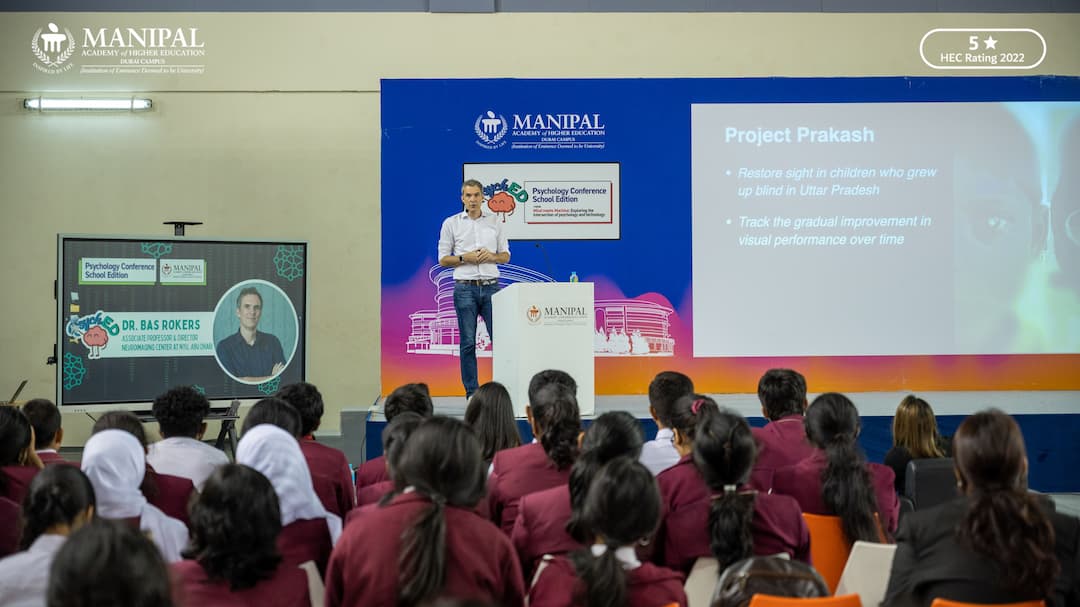
The School of Humanities and Social Sciences proudly hosted the second edition of PsychED, a psychology conference tailored for schools, from May 3rd to 4th, 2023. This conference united students from various schools across the UAE, fostering engaging scholarly competitions and discussions. The chosen theme for this year's event was "Mind Meets Machine: Exploring the Intersection of Psychology and Technology."

Manipal Academy of Higher Education (MAHE) Dubai is delighted to announce that Prof. Suresha and Dr. Sachidananda from the School of Engineering & IT, along with their co-authors from India, have published a significant research paper in RSC Advances (Royal Society of Chemistry) — a prestigious Scopus Q1 journal.
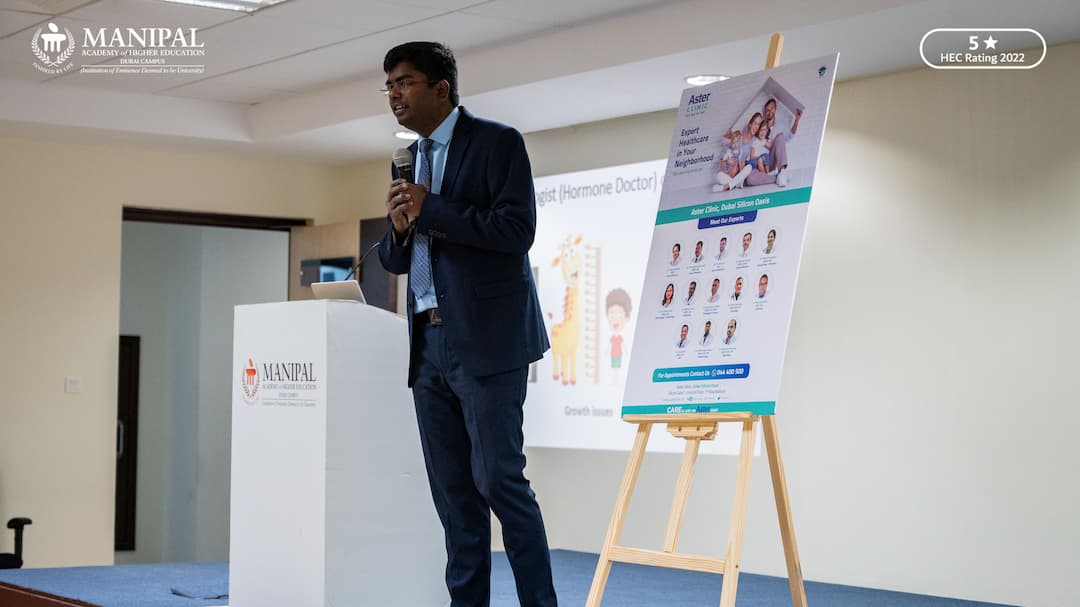
In an effort to spread awareness about the importance of hormonal balance in maintaining overall health, MAHE Dubai students of the COSW club organized a session on the effects of hormones on physical and mental health by Aster Clinic, along with a free health camp. The event was held on the 16th February, and it was open to everyone, including the students and staff members of the university.

MAHE Dubai is delighted to announce that “Incognito”, a final-year student team from the B.Tech Computer Science and Engineering program, has secured First Place at the BITS “Ready Player One” Hackathon held in November 2025.

by Tvisha Udyawar

Dr. Ruchika Ranwa, a faculty member at Manipal Dubai, has published her research paper titled “The Politics of Gatekeeping: Respondents as Gatekeepers and Gatekeepers as Respondents” in the prestigious Qualitative Research journal.

Manipal Academy of Higher Education (MAHE) Dubai is pleased to announce that Dr. Sampath Suranjan, along with faculty collaborators from MIT Manipal, has co-authored a research paper published in Applied Thermal Engineering, a highly ranked Quartile 1 (Q1) journal.

Manipal Academy of Higher Education (MAHE) Dubai is delighted to announce that Dr. Sampath Suranjan and Dr. Sachidananda from the School of Engineering & IT, along with Mechanical Engineering students Kunal Ashok Mulchandani, Arpana S. Biradar, and faculty collaborators from MIT Manipal, have co-authored a research paper published in Scientific Reports, a prestigious Quartile 1 (Q1) journal.
Manipal Academy of Higher Education (MAHE) Dubai Campus marked a significant sustainability milestone yesterday as Dr. Sunitha Prabhuram, under the guidance of Dr. Bhakti More and as part of her SMILES program project, successfully planted the first set of plants in the Community Garden at the MAHE Dubai Campus.

We extend our heartfelt congratulations to Dr. Subburaj Alagarsamy and Dr. Rajani Ramdas on this significant achievement, which underscores Manipal Dubai’s commitment to advancing academic excellence and practical learning.
Manipal Academy of Higher Education (MAHE) Dubai held its annual Convocation on November 14–15, 2025, at the JW Marriott Marquis Hotel in Dubai. The two-day ceremony saw 722 students from 43 batches across 39 programs receive their degrees, bringing MAHE Dubai’s alumni network to over 10,000 graduates.

MAHE Dubai is proud to share that students from the School of Engineering and IT participated in the Etihad Rail Hackathon 2025 and secured Second Place in the competition. The hackathon brought together some of the most promising young innovators from across the UAE, creating a high-energy environment for problem-solving, collaboration, and real-world innovation.

The School of Life Sciences at Manipal Dubai marked World Food Day 2024 with a heartfelt initiative, organizing a food donation drive in collaboration with Dubai Municipality.
MAHE Dubai recently organized Carnival 2022, a two day cultural event, inviting various universities onto the campus to participate across various categories like Dance, Battle of the Bands, Fashion Show and Quiz.
Outstanding student innovation and university-led sustainability efforts were celebrated at the CIBSE MENA Awards 2025, where two major honours were secured in recognition of cutting-edge design and impactful climate action.

Manipal Dubai Hosted an Exclusive Portfolio Development Session with Li Ren

Manipal Academy of Higher Education (MAHE), Dubai proudly announces a significant milestone in its journey of academic excellence—official recognition as a Ministry of Higher Education and Scientific Research (MOHESR)-licensed institution in the UAE.
Manipal Academy of Higher Education (MAHE) Dubai has been prominently featured in Gulf Business, one of the region’s leading business publications, for its forward-thinking approach to embedding ethical AI education across academic programs.

MAHE Dubai congratulates Dr. Asha Sunilkumar on this achievement and appreciates her valuable research contributions.

MAHE Dubai congratulates Dr. Subburaj Alagarsamy on this notable achievement and his contribution to contemporary research in marketing and emerging markets.

The School of Design & Architecture, Manipal Dubai, in collaboration with ANID, is set to launch 'Crafting Careers'.

The ARCHITEXTURE 2025 competition not only highlighted the artistic and technical brilliance of young architects but also provided a platform to celebrate innovative hand-drawn architectural visualization in an increasingly digital world.

MAHE Dubai congratulates Dr. Balamurugan Balusamy on this significant achievement and contribution to the fields of artificial intelligence and agricultural technology.

Manipal Dubai Partners with Kaplan Middle East and North Africa to Integrate Globally Recognized Certifications into Business Programs

We congratulate Dr. Subburaj Alagarsamy and Dr. Sangeetha Vinod on this remarkable achievement and commend their continued dedication to advancing academic research.
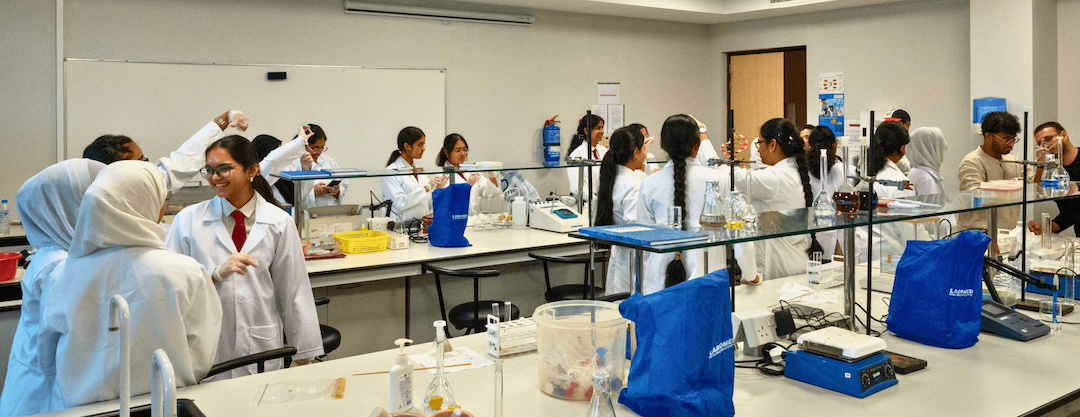
A major scientific review co-authored by Dr. Arif Hussain, Chairperson of the School of Life Sciences at Manipal Academy of Higher Education – Dubai Campus.
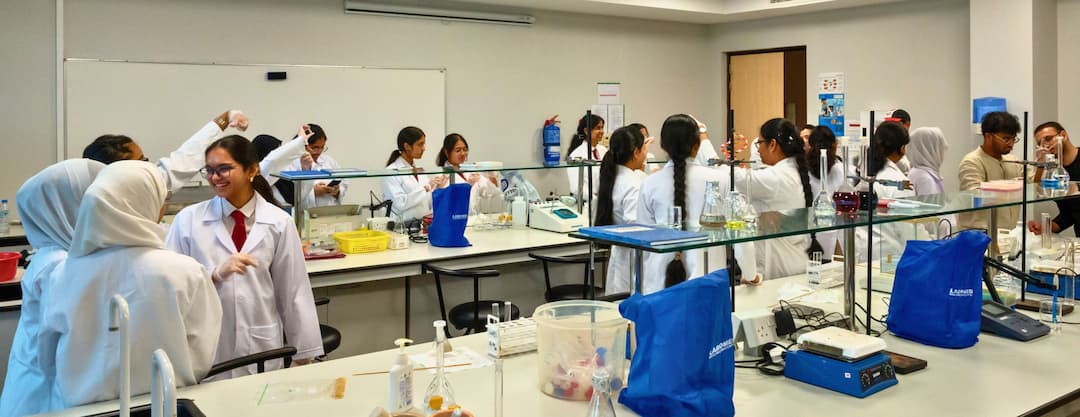
Dr. Arif Hussain, Chairperson of the School of Life Sciences at Manipal Academy of Higher Education – Dubai, has co-authored a significant research study exploring the epigenetic impact of kaempferol, a plant-derived compound, on the growth and migration of cancer cells.
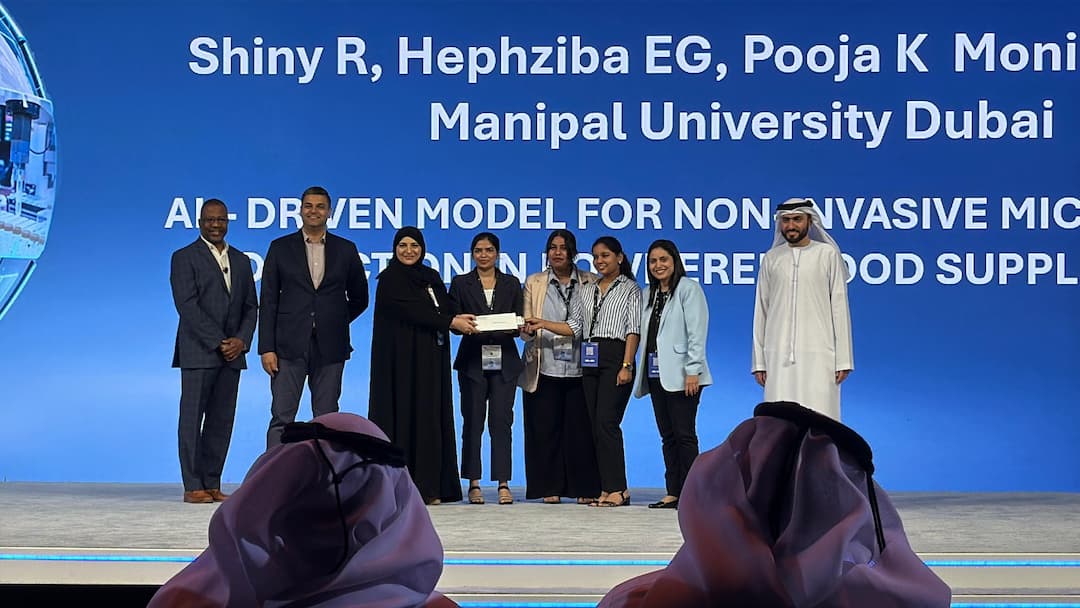
MAHE Dubai congratulates the student team and their mentors for this outstanding accomplishment on an international platform.

MAHE Dubai congratulates Dr. Jereesh K. Elias on the publication of a peer-reviewed article titled: “Mediating role of personality dysfunction and perceived stress on the relationship between stressful life events and psychological well-being among young adult women in India.”
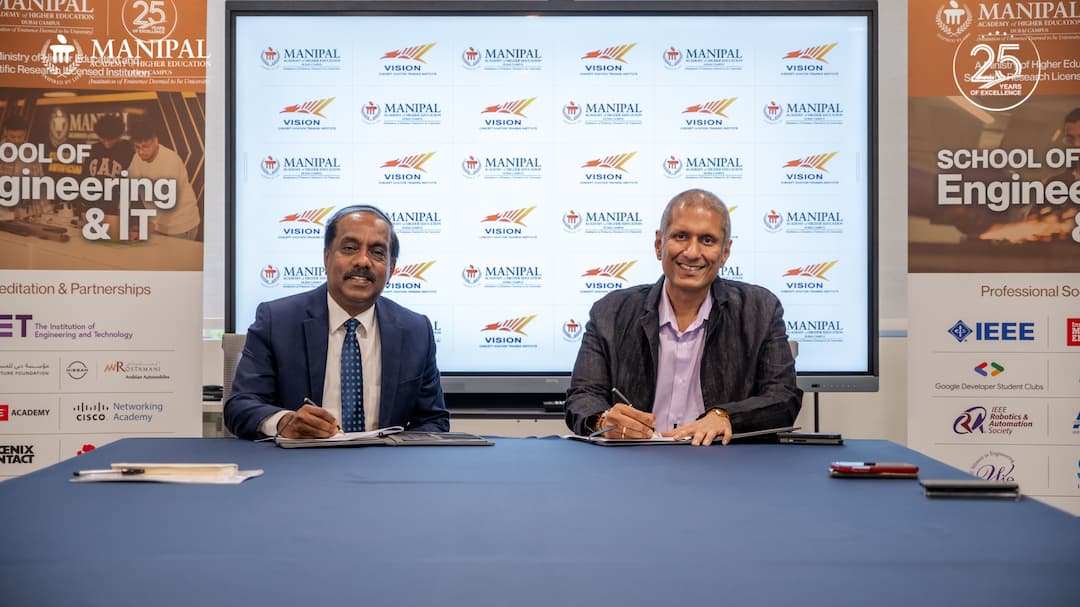
The School of Engineering and IT at Manipal Academy of Higher Education (MAHE) Dubai has signed a Memorandum of Understanding (MoU) with Vision Concept Aviation Training Institute (VCATI) to provide industry-integrated training for aspiring aviation engineers.
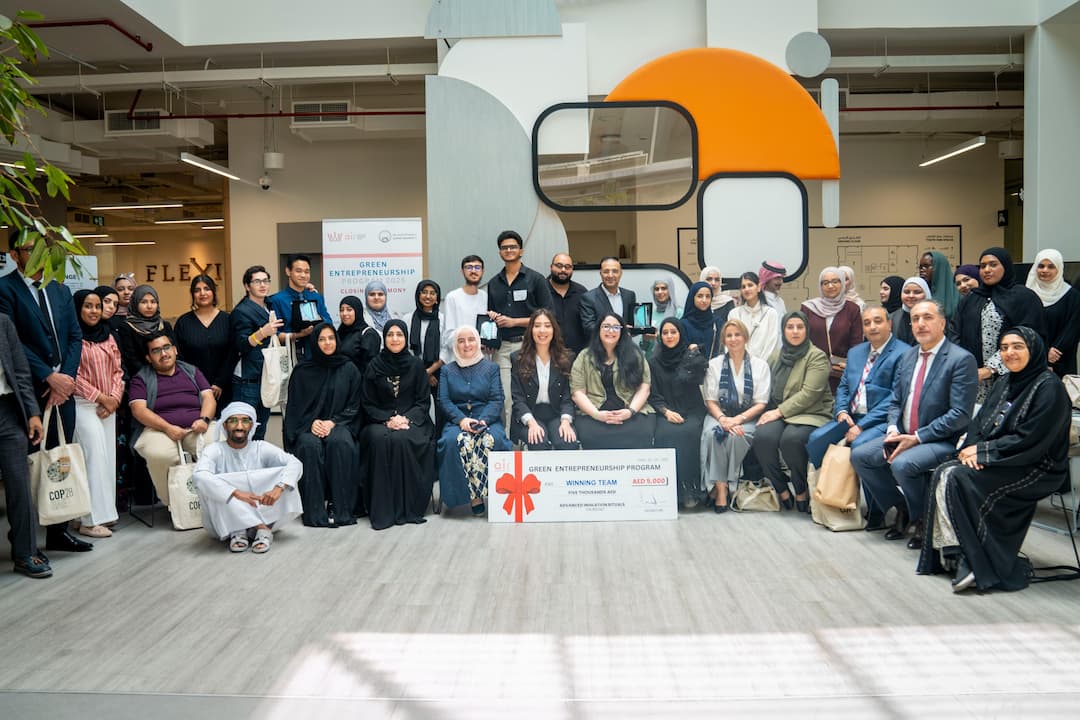
Students from the Manipal Environmental and Climate Society (MECS) at Manipal Academy of Higher Education (MAHE) Dubai have been named champions of the Green Entrepreneurship Program, hosted by Ajman University at the Ajman Youth Hub.

MiSD 2024 to published Special Issue – our design story goes to print

A team of 14 students from the School of Engineering and IT at MAHE Dubai proudly represented the UAE on the global stage at the prestigious Marine Advanced Technology Education (MATE) ROV Competition, held on June 19, 2025, in Michigan, USA.

Edarabia had the opportunity to interview Dr. S. Sudhindra, President of Manipal Academy of Higher Education (MAHE) – Dubai, to discuss the university’s strategic goals, evolving academic focus, and the role of innovation in shaping higher education. Dr. Sudhindra shared valuable insights into MAHE Dubai’s commitment to academic excellence, student empowerment, and fostering a future-ready learning environment that meets the demands of a rapidly changing global landscape

Mr. Aryan Bhingare, a sixth-semester Mechanical Engineering student at MAHE Dubai, has achieved third place in the prestigious ASHRAE Region-at-Large (RAL) Student Competition 2025, marking a proud moment for the university and its ASHRAE student branch.

Prof. Elsa Ashish Thomas Featured in Regional Media Coverage for the Launch of BA (Hons.) Liberal Arts at MAHE Dubai

Manipal Academy of Higher Education (MAHE) Dubai Campus is proud to share that Dr. Shaji, Associate Professor at the School of Design & Architecture, has had his watercolor painting, “Give us this day our daily fish,” selected for exhibition at Fabriano in Acquarello 2026 in Italy.

We are delighted to announce that Dr. Subburaj Alagarsamy, Dr. Sunitha Prabhuram, and Dr. Rajani Ramadas from MAHE Dubai have successfully published their research paper titled “Assessing the Mediating Role of Planned Behavior and Moderating Effects of Ethical Ideology in Immigrant Family-Owned SMEs Sustainability Intentions” in the highly reputed journal Corporate Social Responsibility and Environmental Management.

Panelists say the ability to question and judge content is now education’s top priority.
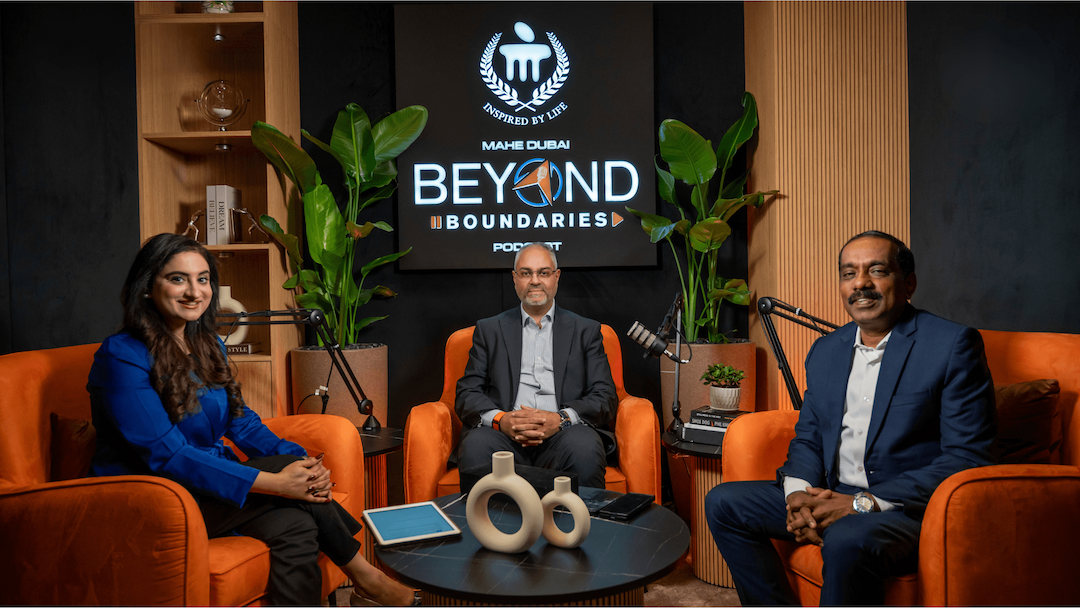
Manipal Academy of Higher Education (MAHE), Dubai Campus has launched Beyond Boundaries, a new podcast series that brings together higher education and industry voices to unpack what “future-ready” really means in the UAE.
Manipal Academy of Higher Education (MAHE) Dubai announces receiving a Verified Impact project stamp for its initiative ‘Seeding Sustainability Program’ aligned with Sustainable Impact, ESG’s and SDG’s in the UAE. This innovative program by Water Alliance was delivered by Manipal Academy of Higher Education Dubai’s students across schools in the UAE and has been selected among the top 20 projects nationwide in MAJRA's Sustainable Impact Challenge 2025, earning the program an AED 20,000 grant.

In recognition of its outstanding commitment to sustainable practices and impactful initiatives, Manipal Academy of Higher Education (Manipal Dubai) has been awarded the “Plan to Action: Year of Sustainability Seal” by the UAE Federal Government.

Manipal Academy of Higher Education (MAHE) Dubai has signed a Memorandum of Understanding (MoU) with Behaviour Enrichment (BE), a leading provider of specialized therapy and educational services for children with diverse developmental needs, to introduce comprehensive industry integrated learning experiences for psychology students.

The UAE wants Dubai in the world’s top 10 education cities by 2033 and MAHE Dubai is answering with programmes built for the next decade of work, not the last.

MAHE Dubai has been spotlighted by Gulf News Friday for placing student wellbeing at the heart of higher education in the UAE. The feature, titled “From Nurseries to Universities: UAE’s shift towards emotional resilience in education” (published online and in print on 22 August 2025), positions MAHE Dubai as a university exemplar in the sector’s wellbeing transformation.

Manipal Academy of Higher Education (MAHE) Dubai congratulates Dr. Ullas Rao, School of Business, on the publication of a new peer-reviewed article, “An Innovative Decision-Making Model for Alternative Regulatory Frameworks Based on Sustainable Development Goal Disclosure Costs,” in Business Ethics, the Environment & Responsibility (Wiley). The paper appears in the journal’s 2025 volume and was accepted on 3 August 2025.
Manipal Academy of Higher Education (MAHE) Dubai is celebrating a milestone year for its Bachelor of Commerce (BCom) ACCA programme, with students achieving multiple UAE national honours.

A sharp increase in the US H-1B visa sponsorship fee is nudging skilled professionals to consider the Gulf. According to Lourd Johnson Fernando, Deputy Manager - Corporate Alliances at MAHE Dubai, this shift is already translating into stronger interest from global employers building teams in the UAE.
With leaders of Indian universities in the UAE
Week of Welcome focuses on student well-being.

MAHE Dubai congratulates Dr. Rajesh Kumar Chandrawat (School of Engineering & Information Technology) on the publication of a peer-reviewed research paper titled: “Investigating Hall effect and viscous dissipation in Saffman/nanofluid MHD duct flow: A combined RBF and fuzzy logic approach.”

MAHE Dubai congratulates Dr. Subburaj Alagarsamy on this significant appointment and wishes him continued success in advancing the university’s research vision.

MAHE Dubai congratulates Dr. Sampath Suranjan and Dr. Sachidananda (School of Engineering & Information Technology), along with third-year Mechanical Engineering students Abdulla Abdul Jaleel, Moin Alam, Jaya Jatin Bhavesh Podugu, and collaborators from MIT, on the publication of their peer-reviewed paper: “Effect of Flow Dynamics on a Rotary Wick Cooler.”

MAHE Dubai congratulates Dr. Rajesh Kumar Chandrawat (School of Engineering & IT) on the publication of a peer-reviewed research article titled: “Fuzzy Pressure Gradient Effects on Immiscible Nanofluid–Dusty Fluid Systems: A Radial Basis Function Pseudo-Spectral Approach.”

MAHE Dubai is proud to announce that students from the 2025 graduating batch of the B.Des Interior Design program have been recognised at the prestigious 19th Commercial Interior Design (CID) MENA Awards 2025, held at Madinat Jumeirah, Dubai.
MAHE Dubai shines at The Economic Times (ET) Education Excellence Awards 2025 – Middle East

Two sisters. One campus. Two national ACCA titles. Sarah Atique Sayed has been named UAE Top Affiliate for the May 2025 sitting, while her younger sister Samairah Atique Sayed earned UAE Prizewinner in Advanced Audit & Assurance (AAA)for the June 2025 sitting.

MAHE Dubai is delighted to announce that two students from the 2025 graduating batch of the Bachelor of Architecture (B.Arch) program have been honoured with the RIBA Gulf Future Architects Awards at Dubai Design Week, November 2025.

MAHE Dubai is proud to announce that Dr. Saranya Ashokkumar, faculty member at the School of Engineering & IT, has co-authored a research paper published in a Web of Science (WoS) and Scopus-indexed Q1 journal, IEEE Transactions on Consumer Electronics (Impact Factor: 10.9).

MAHE Dubai has launched the Centre for Research & Doctoral Studies - a new hub to power the University’s post-CAA growth with stronger research, sharper outcomes, and a next-level PhD ecosystem. Effective immediately, the Centre will deepen institutional support for faculty and scholars while catalyzing high-impact initiatives across schools.

MAHE Dubai is proud to share that Dr. Balamurugan Balusamy has co-authored a research paper published in a Web of Science (WoS) and Scopus-indexed Q1 journal, Elsevier Computers and Electrical Engineering (Impact Factor: 4.9).

MAHE Dubai is pleased to announce the publication of a new edited book co-edited by Dr. Balamurugan Balusamy, Chairperson - School of Engineering & IT. Titled “Post-Quantum Cryptography and IoT Communications for Sustainable Urban Development,” the volume is published by IGI Global Scientific Publishing.

Students from MAHE Dubai’s SOEIT and SODA have secured First Place at the IStructE Skyward Design Challenge, hosted by the Institution of Structural Engineers (UAE Chapter). The team won a cash award of AED 2,000, along with trophies and certificates.

MAHE Dubai congratulates Dr. Sowmya Rao from the School of Life Sciences on the publication of her co-authored research paper, “Targeting Polycystic Ovary Syndrome (PCOS) Pathophysiology with Flavonoids: From Adipokine–Cytokine Crosstalk to Insulin Resistance and Reproductive Dysfunctions.” The study appears in Journal of Pharmaceuticals (Impact Factor 4.8, Q1).

Please join us in congratulating Dr. Sunitha Prabhuram on this achievement.
Students led a campus donation drive with contributions handed over to the UAE Food Bank, and took part in hands-on activities such as the Food Labels Challenge, Food Art Station and Sensory Taste Experience.

On 30th Sept and 1st of October 2025, the University Campus came alive with the hum of tools, and collaborative energy as our 2nd and 3rd year Bachelor of Architecture students participated in the Construction Yard Activity.

Manipal Academy of Higher Education (MAHE) Dubai proudly announces that its programs have been accredited by the UAE Ministry of Higher Education and Scientific Research (MoHESR) through the Commission for Academic Accreditation (CAA).

The MAHE Dubai Dance Club has secured the First Runner-Up position at Gulf Idol 2025 – Season 1, winning a cash prize of AED 8,000. Competing under the team name Invictus, the students delivered a standout performance across the competition and successfully progressed through multiple rounds to reach the finale.
Education Middle East has published a feature-length interview with Dr. S. Sudhindra, Pro Vice Chancellor of MAHE Dubai, exploring how the campus is evolving to meet the needs of today’s learners and employers.

Manipal Academy of Higher Education (MAHE) Dubai is pleased to announce the appointment of Dr. Praveen Gupta, Chairperson of the Manipal Business School, as the new Chair for the Centre for Interdisciplinary Studies (CIS).

Manipal Academy of Higher Education (MAHE) Dubai is pleased to announce that Dr. Rajesh Kumar Chandrawat, Faculty at the School of Engineering & IT (SOEIT), has recently co-authored and published two research papers in reputed international journals indexed in Scopus and the Web of Science Core Collection.

Manipal Academy of Higher Education (MAHE) Dubai is pleased to announce that Dr. Balamurugan Balusamy, Chairperson – School of Engineering & IT (SOEIT), has co-authored a research paper published in Elsevier’s MethodsX journal (Q2, Impact Factor 1.9).

Manipal Academy of Higher Education (MAHE) Dubai is pleased to announce that Dr. Rajesh Kumar and Dr. Asha Sunilkumar from the School of Engineering & IT (SOEIT) have co-authored and published a research paper in a reputed international journal indexed in Scopus (Q2).
Discovering Academic Excellence and Cultural Diversity Unveiling the Unparalleled Experience at Manipal Dubai!

The School of Humanities and Social Sciences proudly hosted the second edition of PsychED, a psychology conference tailored for schools, from May 3rd to 4th, 2023. This conference united students from various schools across the UAE, fostering engaging scholarly competitions and discussions. The chosen theme for this year's event was "Mind Meets Machine: Exploring the Intersection of Psychology and Technology."

Manipal Academy of Higher Education (MAHE) Dubai is delighted to announce that Prof. Suresha and Dr. Sachidananda from the School of Engineering & IT, along with their co-authors from India, have published a significant research paper in RSC Advances (Royal Society of Chemistry) — a prestigious Scopus Q1 journal.

In an effort to spread awareness about the importance of hormonal balance in maintaining overall health, MAHE Dubai students of the COSW club organized a session on the effects of hormones on physical and mental health by Aster Clinic, along with a free health camp. The event was held on the 16th February, and it was open to everyone, including the students and staff members of the university.

MAHE Dubai is delighted to announce that “Incognito”, a final-year student team from the B.Tech Computer Science and Engineering program, has secured First Place at the BITS “Ready Player One” Hackathon held in November 2025.

Dr. Ruchika Ranwa, a faculty member at Manipal Dubai, has published her research paper titled “The Politics of Gatekeeping: Respondents as Gatekeepers and Gatekeepers as Respondents” in the prestigious Qualitative Research journal.

Manipal Academy of Higher Education (MAHE) Dubai is pleased to announce that Dr. Sampath Suranjan, along with faculty collaborators from MIT Manipal, has co-authored a research paper published in Applied Thermal Engineering, a highly ranked Quartile 1 (Q1) journal.

Manipal Academy of Higher Education (MAHE) Dubai is delighted to announce that Dr. Sampath Suranjan and Dr. Sachidananda from the School of Engineering & IT, along with Mechanical Engineering students Kunal Ashok Mulchandani, Arpana S. Biradar, and faculty collaborators from MIT Manipal, have co-authored a research paper published in Scientific Reports, a prestigious Quartile 1 (Q1) journal.
Manipal Academy of Higher Education (MAHE) Dubai Campus marked a significant sustainability milestone yesterday as Dr. Sunitha Prabhuram, under the guidance of Dr. Bhakti More and as part of her SMILES program project, successfully planted the first set of plants in the Community Garden at the MAHE Dubai Campus.

We extend our heartfelt congratulations to Dr. Subburaj Alagarsamy and Dr. Rajani Ramdas on this significant achievement, which underscores Manipal Dubai’s commitment to advancing academic excellence and practical learning.
Manipal Academy of Higher Education (MAHE) Dubai held its annual Convocation on November 14–15, 2025, at the JW Marriott Marquis Hotel in Dubai. The two-day ceremony saw 722 students from 43 batches across 39 programs receive their degrees, bringing MAHE Dubai’s alumni network to over 10,000 graduates.

MAHE Dubai is proud to share that students from the School of Engineering and IT participated in the Etihad Rail Hackathon 2025 and secured Second Place in the competition. The hackathon brought together some of the most promising young innovators from across the UAE, creating a high-energy environment for problem-solving, collaboration, and real-world innovation.
Outstanding student innovation and university-led sustainability efforts were celebrated at the CIBSE MENA Awards 2025, where two major honours were secured in recognition of cutting-edge design and impactful climate action.

Manipal Academy of Higher Education (MAHE), Dubai proudly announces a significant milestone in its journey of academic excellence—official recognition as a Ministry of Higher Education and Scientific Research (MOHESR)-licensed institution in the UAE.
Manipal Academy of Higher Education (MAHE) Dubai has been prominently featured in Gulf Business, one of the region’s leading business publications, for its forward-thinking approach to embedding ethical AI education across academic programs.

The ARCHITEXTURE 2025 competition not only highlighted the artistic and technical brilliance of young architects but also provided a platform to celebrate innovative hand-drawn architectural visualization in an increasingly digital world.

Dr. Arif Hussain, Chairperson of the School of Life Sciences at Manipal Academy of Higher Education – Dubai, has co-authored a significant research study exploring the epigenetic impact of kaempferol, a plant-derived compound, on the growth and migration of cancer cells.

MAHE Dubai congratulates Dr. Jereesh K. Elias on the publication of a peer-reviewed article titled: “Mediating role of personality dysfunction and perceived stress on the relationship between stressful life events and psychological well-being among young adult women in India.”

The School of Engineering and IT at Manipal Academy of Higher Education (MAHE) Dubai has signed a Memorandum of Understanding (MoU) with Vision Concept Aviation Training Institute (VCATI) to provide industry-integrated training for aspiring aviation engineers.

Students from the Manipal Environmental and Climate Society (MECS) at Manipal Academy of Higher Education (MAHE) Dubai have been named champions of the Green Entrepreneurship Program, hosted by Ajman University at the Ajman Youth Hub.

A team of 14 students from the School of Engineering and IT at MAHE Dubai proudly represented the UAE on the global stage at the prestigious Marine Advanced Technology Education (MATE) ROV Competition, held on June 19, 2025, in Michigan, USA.

Edarabia had the opportunity to interview Dr. S. Sudhindra, President of Manipal Academy of Higher Education (MAHE) – Dubai, to discuss the university’s strategic goals, evolving academic focus, and the role of innovation in shaping higher education. Dr. Sudhindra shared valuable insights into MAHE Dubai’s commitment to academic excellence, student empowerment, and fostering a future-ready learning environment that meets the demands of a rapidly changing global landscape

Mr. Aryan Bhingare, a sixth-semester Mechanical Engineering student at MAHE Dubai, has achieved third place in the prestigious ASHRAE Region-at-Large (RAL) Student Competition 2025, marking a proud moment for the university and its ASHRAE student branch.

Manipal Academy of Higher Education (MAHE) Dubai Campus is proud to share that Dr. Shaji, Associate Professor at the School of Design & Architecture, has had his watercolor painting, “Give us this day our daily fish,” selected for exhibition at Fabriano in Acquarello 2026 in Italy.

We are delighted to announce that Dr. Subburaj Alagarsamy, Dr. Sunitha Prabhuram, and Dr. Rajani Ramadas from MAHE Dubai have successfully published their research paper titled “Assessing the Mediating Role of Planned Behavior and Moderating Effects of Ethical Ideology in Immigrant Family-Owned SMEs Sustainability Intentions” in the highly reputed journal Corporate Social Responsibility and Environmental Management.

Manipal Academy of Higher Education (MAHE), Dubai Campus has launched Beyond Boundaries, a new podcast series that brings together higher education and industry voices to unpack what “future-ready” really means in the UAE.
Manipal Academy of Higher Education (MAHE) Dubai announces receiving a Verified Impact project stamp for its initiative ‘Seeding Sustainability Program’ aligned with Sustainable Impact, ESG’s and SDG’s in the UAE. This innovative program by Water Alliance was delivered by Manipal Academy of Higher Education Dubai’s students across schools in the UAE and has been selected among the top 20 projects nationwide in MAJRA's Sustainable Impact Challenge 2025, earning the program an AED 20,000 grant.

In recognition of its outstanding commitment to sustainable practices and impactful initiatives, Manipal Academy of Higher Education (Manipal Dubai) has been awarded the “Plan to Action: Year of Sustainability Seal” by the UAE Federal Government.

Manipal Academy of Higher Education (MAHE) Dubai has signed a Memorandum of Understanding (MoU) with Behaviour Enrichment (BE), a leading provider of specialized therapy and educational services for children with diverse developmental needs, to introduce comprehensive industry integrated learning experiences for psychology students.

MAHE Dubai has been spotlighted by Gulf News Friday for placing student wellbeing at the heart of higher education in the UAE. The feature, titled “From Nurseries to Universities: UAE’s shift towards emotional resilience in education” (published online and in print on 22 August 2025), positions MAHE Dubai as a university exemplar in the sector’s wellbeing transformation.

Manipal Academy of Higher Education (MAHE) Dubai congratulates Dr. Ullas Rao, School of Business, on the publication of a new peer-reviewed article, “An Innovative Decision-Making Model for Alternative Regulatory Frameworks Based on Sustainable Development Goal Disclosure Costs,” in Business Ethics, the Environment & Responsibility (Wiley). The paper appears in the journal’s 2025 volume and was accepted on 3 August 2025.

A sharp increase in the US H-1B visa sponsorship fee is nudging skilled professionals to consider the Gulf. According to Lourd Johnson Fernando, Deputy Manager - Corporate Alliances at MAHE Dubai, this shift is already translating into stronger interest from global employers building teams in the UAE.

MAHE Dubai congratulates Dr. Rajesh Kumar Chandrawat (School of Engineering & Information Technology) on the publication of a peer-reviewed research paper titled: “Investigating Hall effect and viscous dissipation in Saffman/nanofluid MHD duct flow: A combined RBF and fuzzy logic approach.”

MAHE Dubai congratulates Dr. Sampath Suranjan and Dr. Sachidananda (School of Engineering & Information Technology), along with third-year Mechanical Engineering students Abdulla Abdul Jaleel, Moin Alam, Jaya Jatin Bhavesh Podugu, and collaborators from MIT, on the publication of their peer-reviewed paper: “Effect of Flow Dynamics on a Rotary Wick Cooler.”

MAHE Dubai congratulates Dr. Rajesh Kumar Chandrawat (School of Engineering & IT) on the publication of a peer-reviewed research article titled: “Fuzzy Pressure Gradient Effects on Immiscible Nanofluid–Dusty Fluid Systems: A Radial Basis Function Pseudo-Spectral Approach.”

MAHE Dubai is proud to announce that students from the 2025 graduating batch of the B.Des Interior Design program have been recognised at the prestigious 19th Commercial Interior Design (CID) MENA Awards 2025, held at Madinat Jumeirah, Dubai.

Two sisters. One campus. Two national ACCA titles. Sarah Atique Sayed has been named UAE Top Affiliate for the May 2025 sitting, while her younger sister Samairah Atique Sayed earned UAE Prizewinner in Advanced Audit & Assurance (AAA)for the June 2025 sitting.

MAHE Dubai is delighted to announce that two students from the 2025 graduating batch of the Bachelor of Architecture (B.Arch) program have been honoured with the RIBA Gulf Future Architects Awards at Dubai Design Week, November 2025.

MAHE Dubai is proud to announce that Dr. Saranya Ashokkumar, faculty member at the School of Engineering & IT, has co-authored a research paper published in a Web of Science (WoS) and Scopus-indexed Q1 journal, IEEE Transactions on Consumer Electronics (Impact Factor: 10.9).

MAHE Dubai has launched the Centre for Research & Doctoral Studies - a new hub to power the University’s post-CAA growth with stronger research, sharper outcomes, and a next-level PhD ecosystem. Effective immediately, the Centre will deepen institutional support for faculty and scholars while catalyzing high-impact initiatives across schools.

MAHE Dubai is proud to share that Dr. Balamurugan Balusamy has co-authored a research paper published in a Web of Science (WoS) and Scopus-indexed Q1 journal, Elsevier Computers and Electrical Engineering (Impact Factor: 4.9).

MAHE Dubai is pleased to announce the publication of a new edited book co-edited by Dr. Balamurugan Balusamy, Chairperson - School of Engineering & IT. Titled “Post-Quantum Cryptography and IoT Communications for Sustainable Urban Development,” the volume is published by IGI Global Scientific Publishing.

Students from MAHE Dubai’s SOEIT and SODA have secured First Place at the IStructE Skyward Design Challenge, hosted by the Institution of Structural Engineers (UAE Chapter). The team won a cash award of AED 2,000, along with trophies and certificates.

MAHE Dubai congratulates Dr. Sowmya Rao from the School of Life Sciences on the publication of her co-authored research paper, “Targeting Polycystic Ovary Syndrome (PCOS) Pathophysiology with Flavonoids: From Adipokine–Cytokine Crosstalk to Insulin Resistance and Reproductive Dysfunctions.” The study appears in Journal of Pharmaceuticals (Impact Factor 4.8, Q1).
Students led a campus donation drive with contributions handed over to the UAE Food Bank, and took part in hands-on activities such as the Food Labels Challenge, Food Art Station and Sensory Taste Experience.

Manipal Academy of Higher Education (MAHE) Dubai proudly announces that its programs have been accredited by the UAE Ministry of Higher Education and Scientific Research (MoHESR) through the Commission for Academic Accreditation (CAA).

The MAHE Dubai Dance Club has secured the First Runner-Up position at Gulf Idol 2025 – Season 1, winning a cash prize of AED 8,000. Competing under the team name Invictus, the students delivered a standout performance across the competition and successfully progressed through multiple rounds to reach the finale.

Manipal Academy of Higher Education (MAHE) Dubai is pleased to announce that Dr. Rajesh Kumar Chandrawat, Faculty at the School of Engineering & IT (SOEIT), has recently co-authored and published two research papers in reputed international journals indexed in Scopus and the Web of Science Core Collection.

Manipal Academy of Higher Education (MAHE) Dubai is pleased to announce that Dr. Balamurugan Balusamy, Chairperson – School of Engineering & IT (SOEIT), has co-authored a research paper published in Elsevier’s MethodsX journal (Q2, Impact Factor 1.9).

Manipal Academy of Higher Education (MAHE) Dubai is pleased to announce that Dr. Rajesh Kumar and Dr. Asha Sunilkumar from the School of Engineering & IT (SOEIT) have co-authored and published a research paper in a reputed international journal indexed in Scopus (Q2).

